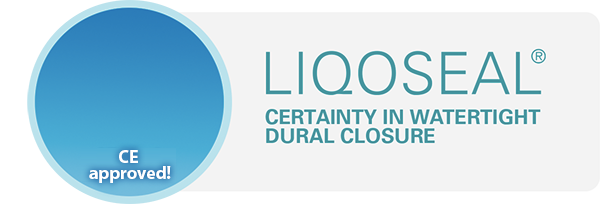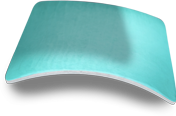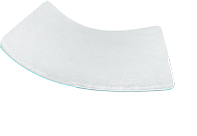Polyganics Achieves Positive 3-month Follow-up Data of ENCASE I, the First Clinical Trial for LIQOSEAL®
Groningen, The Netherlands, 17 September 2019 – Polyganics, a medical technology company developing, manufacturing and commercializing bioresorbable medical devices, has today announced positive data from its ENCASE I* clinical trial.
The ENCASE I trial is focused on the evaluation of the safety and performance of LIQOSEAL® in reducing cerebrospinal fluid (CSF) leakage following elective cranial surgery. The 3-month results of ENCASE I show the absence of CSF leakage as confirmed by MRI, no clinically significant swelling, and no device-related adverse events following surgeries that used LIQOSEAL® for dural closure. Polyganics has submitted its filing for the CE Mark of LIQOSEAL® based upon these positive data from the ENCASE I trial.
LIQOSEAL® is a safe, synthetic, easy-to-use dura sealant patch, developed using Polyganics’ proprietary bioresorbable polymer technology, already applied worldwide in multiple clinical areas. The patch is indicated for use as an adjunct to standard methods of cranial dural repair to provide a watertight closure of the dura mater and reduce CSF leakage. In vivo studies show that LIQOSEAL® also supports regeneration of the dura mater during the critical healing period, by acting as a scaffold for new fibrotic layer formation (‘neodura’).
Dr Tristan van Doormaal, Neurosurgeon at the University Hospital Zurich and University Medical Center (UMC) in Utrecht, Principal Investigator of the study and leader of the initial research project at the Brain Technology Institute (BTI) commented: “CSF leakage remains a devastating complication for neurosurgical patients. These follow-up results from ENCASE I support previous in vitro and in vivo observations and indicate that LIQOSEAL® is safe to use in patients and seemingly shows better reduction of CSF leakage over standard of care methods as referred to in clinical literature. Interestingly, the unique scaffolding characteristic of this purely synthetic resorbable product, promotes the formation of a new layer of native dura, the layer that surrounds the brain and the spinal cord and which is responsible for keeping in the cerebrospinal fluid.” He continued: “I am pleased with the submission, as CE approval will enable surgeons and patients to benefit from LIQOSEAL®’s unique properties. I look forward to further assessing LIQOSEAL®’s value in our area of surgery in the future randomized controlled study, ENCASE II.”
Rudy Mareel, CEO of Polyganics, commented: “The submission of LIQOSEAL® for CE marking is another important step as we work towards commercializing this product, which is the first in our Neurosurgery portfolio. We are very encouraged by the positive data that enabled us to file this submission. Following CE approval, we plan to launch LIQOSEAL® in a number of countries across Europe, and ultimately plan to submit the product for pre-market approval (PMA) to the US Food and Drug Administration.”
Polyganics will be present at EANS 2019 (European Association of Neurological Societies) in Dublin, 24th-28th September, at the Company booth (#56). Dr. Tristan van Doormaal will provide an overview of the development of LIQOSEAL® in an oral presentation at Poster booth 1 in the 10:00 – 10:40 am session on Friday 27th September.
* ENCASE I: Single-arm, open-label, multi-center study to Evaluate the safety and performaNCe of DurA Sealant Patch in reducing CSF leakage following Elective cranial surgery
– ENDS –
For more information please contact:
Polyganics
Paul Roos, Chief Financial Officer
Romke Ribbels, Director Marketing & Business Development
T: +31 50 588 65 88
E: info@polyganics.com
Instinctif Partners
Dr Christelle Kerouedan / Dr Katie Duffell
T: +44 (0)20 7457 2020
E: polyganics@instinctif.com
Notes to editors
About Polyganics
Polyganics is a medical technology company with multiple versatile polymer platforms. The company develops, manufactures and commercializes innovative bioresorbable medical devices that facilitate tissue repair and regeneration.
Polyganics’ portfolio includes products developed in-house and in collaboration with leading medical technology companies and academic centers of excellence. In the Peripheral Nerve Repair (PNR) field, the portfolio includes three marketed products: VIVOSORB® for minimizing unwanted tissue adhesions after surgery; NEUROLAC® for supporting PNR following hand surgery; and NEUROCAP® for the management of symptomatic neuromas. In the Neurosurgery and General Surgery field, products in development include a sealant for the dura membrane (LIQOSEAL®) and the Liver and Pancreas Sealant Patch.
In 2014, Polyganics sold its Ear, Nose & Throat (ENT) surgery business unit (the NASOPORE® product family including HEMOPORE®, SINUPORE® and OTOPORE® and NASOPORE-FD®) to Stryker, one of the world’s leading medical technology companies. Polyganics continues to manufacture the NASOPORE® product range for Stryker. To date, Polyganics has produced and delivered more than 5 million devices.
Polyganics is a privately held company based in Groningen, The Netherlands, a center of biomedical engineering excellence, where it has an ISO 13485-certified manufacturing facility. The company’s polymer platform technologies are protected by a broad portfolio of patents and its products have received clearance from the US FDA, CE-approval, and approval from CFDA and other international authorities.
For more information, visit: www.polyganics.com , or follow us on LinkedIn: Polyganics BV
About CSF leakage
CSF leakage is a widely recognized complication of neurosurgical procedures. It represents a significant patient burden, resulting in increased morbidity, prolonged hospital stays, possible surgical revisions, and enhanced costs.1,2 Incidence rates vary depending on age, indication, location of surgery and underlying pathology, but in total CSF leakage occurs in 4-32% of surgical cases.3,4
About ENCASE I
ENCASE I, the first-in-human trial of LIQOSEAL®, is a single-arm, open-label study evaluating the safety and performance of LIQOSEAL® in reducing CSF leakage following elective cranial surgery. 40 adult patients have been recruited at three sites across the Netherlands and Switzerland, with follow-up due to span a period of 12 months.
Details of the ENCASE I study can be found at: https://clinicaltrials.gov/ct2/show/NCT03566602
References
- Hutter G, von Felten S, Sailer M, Schulz M, Mariani L. Risk factors for postoperative CSF leakage after elective craniotomy and the efficacy of fleece bound tissue sealing against dural suturing alone: a randomized controlled trial. Neurosurgery. 2014. Sep; 121:724-744
- Grotenhuis J. Costs of postoperative cerebrospinal fluid leakage: 1-year, retrospective analysis of 412 consecutive nontrauma cases. Surg Neurol. 2005, Dec; 64(6)|:490-3
- Kinaci A, Algra A, Heuts S, O’Donnell D, van der Zwan A, van Doormaal T. Effectiveness of Dural Sealants in Prevention of Cerebrospinal Fluid Leakage After Craniotomy: A Systematic Review. World Neurosurg. 2018 Oct;118:368-376
- van Doormaal T, Kinaci A, van Thoor S, Redegeld S, Bergmann W, van der Zwan A.Usefulness of Sealants for Dural Closure: Evaluation in an In Vitro Model. Oper Neurosurg (Hagerstown). 2018 Oct 1;15(4):425-432.




